Movies We Like
Handpicked By The Amoeba Staff
Films selected and reviewed by discerning movie buffs, television junkies, and documentary diehards (a.k.a. our staff).
Purple Rain
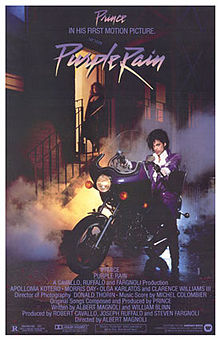 As opposed to being a dated period piece from 1984, Purple Rain is more like a time capsule from another planet. A truly ambitious film debut for funk ‘n rock star Prince, the success of both the film Purple Rain and its soundtrack helped send Prince’s career into another stratosphere. This kinda sorta autobiography of Prince’s early days playing at Minneapolis music venue First Avenue focuses on the struggles of the brooding and mopey musician as he tries to navigate his domestic abuse impulses and his love of frilly shirts. Though completely entertaining it’s actually maybe more depressing than the Eminem flick 8 Mile though not even close to the mental anguish that the Bjork film Dancer in the Dark can cause. At the time of release Purple Rain was a massive hit but it was also justly scorned for its misogynistic attitudes towards women. Luckily now the film feels so over the top that instead of being offensive it plays more like a glammed-out cartoon.
As opposed to being a dated period piece from 1984, Purple Rain is more like a time capsule from another planet. A truly ambitious film debut for funk ‘n rock star Prince, the success of both the film Purple Rain and its soundtrack helped send Prince’s career into another stratosphere. This kinda sorta autobiography of Prince’s early days playing at Minneapolis music venue First Avenue focuses on the struggles of the brooding and mopey musician as he tries to navigate his domestic abuse impulses and his love of frilly shirts. Though completely entertaining it’s actually maybe more depressing than the Eminem flick 8 Mile though not even close to the mental anguish that the Bjork film Dancer in the Dark can cause. At the time of release Purple Rain was a massive hit but it was also justly scorned for its misogynistic attitudes towards women. Luckily now the film feels so over the top that instead of being offensive it plays more like a glammed-out cartoon.
Prince plays “The Kid,” and though his band The Revolution seems to have a loyal following, the club owner (Billy Sparks) thinks they aren’t drawing the crowds they should be. He seems to side with The Kid’s chief rival, the zoot-suited Morris Day and his band The Time. He wants the Kid to stop doing that “one song shit” and making the kind of music that only he understands, or he’s going to be axed from the club’s roster. When a foxy new Russ Meyer-esqe babe, Apollonia shows up on the scene, The Kid woos her with motorcycle rides and by ogling her from behind his oversized sun glasses. Strangely he still lives with his parents, where his washed-up musician father (Clearance Williams III of Mod Squad fame) beats up his mother (Olga Karlatos who was in Lucio Fulci’s Zombie) on a nightly basis—a habit The Kid seems to be picking up with Apollonia. And like the song lyrics go, “maybe I’m just like my father, too bold. Why do we scream at each other? This is what it sounds like when doves cry.”
Pieces
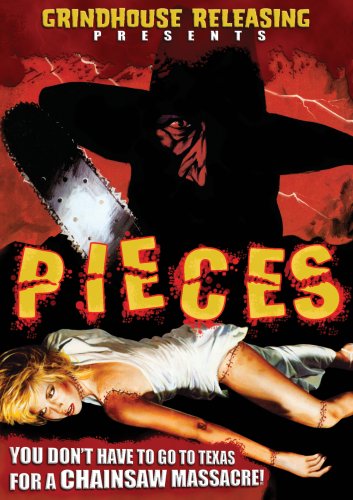 A young, neatly dressed boy sits in his room mumbling the lyrics to the Humpty Dumpty nursery rhyme with the words, “couldn't put the pieces back together again” the most audible. He's kneeling over a puzzle in deep thought when his mother enters the room and peers over his shoulder to look at it. It's a jigsaw of a naked woman, and in disbelief and outrage she starts slapping her son around. She instructs him to go get a plastic bag so that she can throw away the “filth.” She compares him to his no-good father and breaks the mirror with his framed portrait before rummaging through his things looking for a smut stash. The boy returns with an ax and hacks her to death before sawing off her head. He then returns to and completes his puzzle with blood-smeared hands. During the time it took for him to dismember his mother, their maid quizzically stood outside the home wondering why no one answered the door. She worries that something's amiss, so she gets a pair of policemen to break the door down. The boy hides in the closet while the maid and the officers search for him and his mother. They find her head on a chest of drawers and him standing in a closet hollering for his mother and creating the impression that an intruder killed her. The adults believe him and send him to live with his aunt.
A young, neatly dressed boy sits in his room mumbling the lyrics to the Humpty Dumpty nursery rhyme with the words, “couldn't put the pieces back together again” the most audible. He's kneeling over a puzzle in deep thought when his mother enters the room and peers over his shoulder to look at it. It's a jigsaw of a naked woman, and in disbelief and outrage she starts slapping her son around. She instructs him to go get a plastic bag so that she can throw away the “filth.” She compares him to his no-good father and breaks the mirror with his framed portrait before rummaging through his things looking for a smut stash. The boy returns with an ax and hacks her to death before sawing off her head. He then returns to and completes his puzzle with blood-smeared hands. During the time it took for him to dismember his mother, their maid quizzically stood outside the home wondering why no one answered the door. She worries that something's amiss, so she gets a pair of policemen to break the door down. The boy hides in the closet while the maid and the officers search for him and his mother. They find her head on a chest of drawers and him standing in a closet hollering for his mother and creating the impression that an intruder killed her. The adults believe him and send him to live with his aunt.
Forty years pass and the plot is now focused on a university at which a girl has been murdered with a chainsaw. The details become grizzlier when they discover that a part of the girl's body is missing from the scene. Detectives Bracken (Christopher George) and Holden (Frank Brana) are on the case snooping around the school and asking questions. The Dean (Edmund Purdom) of the university is more than willing to give them access to the school’s resources in order to catch the killer. Meanwhile, Kendall (Ian Sera), the campus Romeo, is flirting with a girl he intends to meet later at the campus pool. Their meeting never happens because she becomes the killer's next victim. The detectives start to believe that someone on the campus is the killer, so they interview the staff and look to Kendall for help in profiling students since they've ruled him out as a suspect. Despite their diligence, more girls are found cut to pieces. The viewer watches from the killer's point-of-view as each stomach-churning death unfolds. The disgust is amplified by extreme close-ups of the chainsaw sinking into what looks like real flesh, and the sound of the killer's heavy breathing alongside blood-curdling screams. You then see cut-away shots of his gloved hands returning to the old bloody jigsaw puzzle and carting limbs into an industrial-sized refrigerator.
Bad Ronald
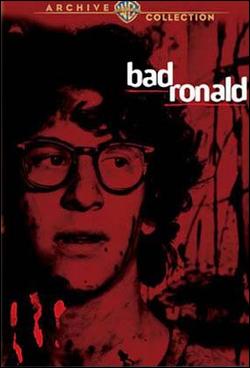 Ronald (Scott Jacoby) is a good boy; he's the most caring and dutiful son a mother could ask for. His mother Elaine (Kim Hunter) is divorced and takes pride in the fact that she dismissed alimony in exchange for the sole custody of her son. She has complications with her gallbladder, and Ronald is quick to come to her side when she's cringing in pain. He's now a senior in high school, and his mother has hopes of him one day becoming a doctor. For his birthday she gives him a tool box and art supplies, the latter he's thrilled about because he wants to illustrate the characters from the stories he likes to write. On the night of his birthday he dresses smart and decides to go ask a girl from school out on a date. His overbearing mother tells him to heed her warnings about the self-centered girl that he's infatuated with before letting him go on his way. He goes to her house and finds her swimming with the kids who bully him at school. He's obviously rejected by the girl and leaves shortly after. While running home he accidentally knocks a little girl off her bike. The girl begins shouting at him and taunting, eventually making claims about Ronald and his mother's weirdness. He demands an apology from her, and when it doesn't surface he shoves the girl to the ground and she dies in a freak accident.
Ronald (Scott Jacoby) is a good boy; he's the most caring and dutiful son a mother could ask for. His mother Elaine (Kim Hunter) is divorced and takes pride in the fact that she dismissed alimony in exchange for the sole custody of her son. She has complications with her gallbladder, and Ronald is quick to come to her side when she's cringing in pain. He's now a senior in high school, and his mother has hopes of him one day becoming a doctor. For his birthday she gives him a tool box and art supplies, the latter he's thrilled about because he wants to illustrate the characters from the stories he likes to write. On the night of his birthday he dresses smart and decides to go ask a girl from school out on a date. His overbearing mother tells him to heed her warnings about the self-centered girl that he's infatuated with before letting him go on his way. He goes to her house and finds her swimming with the kids who bully him at school. He's obviously rejected by the girl and leaves shortly after. While running home he accidentally knocks a little girl off her bike. The girl begins shouting at him and taunting, eventually making claims about Ronald and his mother's weirdness. He demands an apology from her, and when it doesn't surface he shoves the girl to the ground and she dies in a freak accident.
When he comes home hours later with soil on his now-ruined jacked, his mother asks him what's wrong. He confesses that he killed the neighbor girl in an accident and then buried her body in panic. His mother won't hear of him going to jail, so the two work hard through the night creating a secret passage in their Victorian home with the intention of hiding him there until the heat dies down. While inside, Ronald exercises, studies and illustrates his story about a mystical land on the walls. The story has a prince, who finds a princess to fall in love with him, and an evil duke who tries to destroy their happiness.
Traffic
 After his massive debut film Sex, Lies, and Videotape helped jump start the impressive independent film movement of the 1990s, director Steven Soderbergh had a rough go in the world of filmmaking. Though his follow-ups King of The Hill, Kafka, and The Underneath were all interesting, none lived up to the promise shown earlier. It wasn’t until the end of the decade that Soderbergh started to really find his stride with a pair of terrific crime thrillers, Out of Sight and The Limey. Often working as his own cinematographer his films developed a grainy, handheld look and an almost docudrama feel. In 2000 Soderbergh peaked critically with the solid drama Erin Brockovich and his two-and-a-half hour epic Traffic, a truly outstanding look at the drug trade in both the United States and Mexico.
After his massive debut film Sex, Lies, and Videotape helped jump start the impressive independent film movement of the 1990s, director Steven Soderbergh had a rough go in the world of filmmaking. Though his follow-ups King of The Hill, Kafka, and The Underneath were all interesting, none lived up to the promise shown earlier. It wasn’t until the end of the decade that Soderbergh started to really find his stride with a pair of terrific crime thrillers, Out of Sight and The Limey. Often working as his own cinematographer his films developed a grainy, handheld look and an almost docudrama feel. In 2000 Soderbergh peaked critically with the solid drama Erin Brockovich and his two-and-a-half hour epic Traffic, a truly outstanding look at the drug trade in both the United States and Mexico.
A remake of the British TV mini-series Traffik, Soderbergh’s film follows the original very carefully, but expands on the political potholes faced by the politicians while changing the land of the traffickers from Pakistan to Mexico. It all adds up to a more complex tale. The film follows three stories taking place in Tijuana, San Diego, and Ohio. Each story is given a different look and color scheme—Ohio looks cold and blue, while Mexico is washed out and yellow. The film is giant with over a hundred speaking roles, and even includes actual politicians Barbara Boxer and Orrin Hatch playing themselves for added realism.
The Saint of Fort Washington
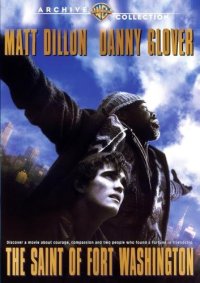 I've never been one for politics, nor do I understand the “politics” of many things—especially the politics which apply to motion pictures. So many wonderful films will be lost to the generations that will follow our own. Sometimes a movie's unavailability might be due to music rights, or other business-related issues, and as years pass, there are fewer people who are aware of its existence. To say that The Saint of Fort Washington fits into this category would be a slight exaggeration; the film is accessible on previously owned VHS, Laser Discs and European DVDs, and is now available domestically from Warner Bros. It features early performances by Matt Dillon, Danny Glover, and Ving Rhames—performances which, in my honest opinion, are their best by far. But for some reason, the movie was just swept under the carpet. I've yet to meet another person who saw it in the '90s, and its Box Office figures were laughable; it's safe to say that it never had a fan base. I'll never understand why, but I would guess that it has something to do with its heart-wrenching realism. It is by far one of the most important dramas about homelessness, mental illness, and religion. Everyone who lives in a large city or has something to say about our country's issues with poverty and the homeless should see it.
I've never been one for politics, nor do I understand the “politics” of many things—especially the politics which apply to motion pictures. So many wonderful films will be lost to the generations that will follow our own. Sometimes a movie's unavailability might be due to music rights, or other business-related issues, and as years pass, there are fewer people who are aware of its existence. To say that The Saint of Fort Washington fits into this category would be a slight exaggeration; the film is accessible on previously owned VHS, Laser Discs and European DVDs, and is now available domestically from Warner Bros. It features early performances by Matt Dillon, Danny Glover, and Ving Rhames—performances which, in my honest opinion, are their best by far. But for some reason, the movie was just swept under the carpet. I've yet to meet another person who saw it in the '90s, and its Box Office figures were laughable; it's safe to say that it never had a fan base. I'll never understand why, but I would guess that it has something to do with its heart-wrenching realism. It is by far one of the most important dramas about homelessness, mental illness, and religion. Everyone who lives in a large city or has something to say about our country's issues with poverty and the homeless should see it.
In it we find Matthew (Matt Dillon), a young schizophrenic man who is made homeless overnight. A slumlord has leveled his building without permits, which means that collecting his government check is impossible because he no longer has an address for them to send it to. He takes to the streets and by nightfall he's directed to the Fort Washington's Shelter for Men. While in line he sees a man nursing a wounded knee. He takes out his camera, the only thing of value that he has, and snaps a picture. The man, Jerry, (Danny Glover), becomes outraged and tries to damage the camera until young Matthew shows him that there's no film inside. Though Jerry is baffled at how someone could be a photographer without film in a camera, the two seem to have an understanding of one another. While in the shelter, Jerry tells him how the place works and what/who to avoid; what the thugs steal first while you're asleep and who, of the hundreds of men you lay your head next to, is a threat. The ringleader in terror at the shelter is Little Leroy (Ving Rhames), a man who'll stop at nothing to oppress everyone in the shelter and kill whoever gets in the way. By morning Jerry, a willful Vietnam veteran, is back on the streets hustling. Young Matthew can't help but shadow him and feed off his wisdom and street smarts.
Wise Blood
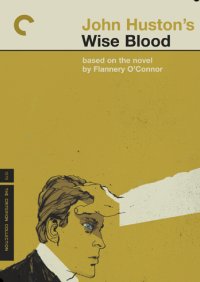 Films that are adaptations from novels can be a delicate experience. For those who are diehard fans of certain books, it can sometimes seem like a betrayal to watch films inspired by them. Perhaps betrayal is a strong word to use, but many have high expectations for these kinds of films. My review of Wise Blood, an adaptation of Flannery O' Connor's acclaimed novel, is not to disregard the high standards that people hold it to. Rather, it seems that works from two different mediums should be held to completely different standards. Any storyteller will inform you that it is, for lack of a better word, easier, to develop a character on a page. But if a director can create something new on the screen while paying their respects to its source, what's there to complain about?
Films that are adaptations from novels can be a delicate experience. For those who are diehard fans of certain books, it can sometimes seem like a betrayal to watch films inspired by them. Perhaps betrayal is a strong word to use, but many have high expectations for these kinds of films. My review of Wise Blood, an adaptation of Flannery O' Connor's acclaimed novel, is not to disregard the high standards that people hold it to. Rather, it seems that works from two different mediums should be held to completely different standards. Any storyteller will inform you that it is, for lack of a better word, easier, to develop a character on a page. But if a director can create something new on the screen while paying their respects to its source, what's there to complain about?
Wise Blood is the story of a discharged soldier named Hazel Motes (Brad Dourif) who returns to a desolate town in the hopes of finding his purpose and having a sort of spiritual adventure. He has no attachment to his status as a veteran and sheds his uniform quickly to make room for a suit and a large black hat. Folks around town say that he looks like a preacher, and he's quick to shoot back that he doesn't believe in anything. Through flashbacks, we establish that he was raised to be God-fearing. In his childhood, he sat petrified in the pews or close to the preacher, who made everyone feel as though they were “not clean” and needed to be redeemed. As a result, he believed the preacher and would inflict pain on his body whenever he felt touched with sin, similar to Christian flagellants.
Grease
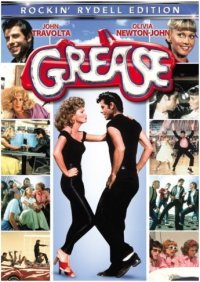 At the peak of the disco era, the film version of the so-so Broadway musical Grease managed to be the perfect vehicle to celebrate 1950s nostalgia while becoming an iconic relic of '70s pop culture. Since its release it has become a rite of passage for young people—a romanticized version of teen rebellion and young love. It’s surprisingly raunchy, but very funny, with great music and very energetic choreography. More then Rebel Without a Cause or Blackboard Jungle it has actually taken over as the ultimate representation of 1950s teen life. While the earlier films were made by people who were afraid of that generation’s American teenager, Grease was created to celebrate them.
At the peak of the disco era, the film version of the so-so Broadway musical Grease managed to be the perfect vehicle to celebrate 1950s nostalgia while becoming an iconic relic of '70s pop culture. Since its release it has become a rite of passage for young people—a romanticized version of teen rebellion and young love. It’s surprisingly raunchy, but very funny, with great music and very energetic choreography. More then Rebel Without a Cause or Blackboard Jungle it has actually taken over as the ultimate representation of 1950s teen life. While the earlier films were made by people who were afraid of that generation’s American teenager, Grease was created to celebrate them.
Black Sunday
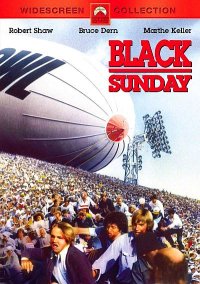 Before novelist Thomas Harris created the character of Hannibal Lecter for his Red Dragon book series, he had written one other novel entitled Black Sunday. It was a terrorist thriller obviously inspired by the massacre at the 1972 Summer Olympics in Munich. The adaptation for the screen by legendary screenwriter Ernst Lehman (North by Northwest, Sweet Smell of Success) provides the setting for one of the best action flicks of the 1970s and another cool movie notch in the belt for director John Frankenheimer. Along with The Deep released the same year (’77), Black Sunday would provide the peak role for actor Robert Shaw as a big star leading man, before tragically dying of a heart attack the following year.
Before novelist Thomas Harris created the character of Hannibal Lecter for his Red Dragon book series, he had written one other novel entitled Black Sunday. It was a terrorist thriller obviously inspired by the massacre at the 1972 Summer Olympics in Munich. The adaptation for the screen by legendary screenwriter Ernst Lehman (North by Northwest, Sweet Smell of Success) provides the setting for one of the best action flicks of the 1970s and another cool movie notch in the belt for director John Frankenheimer. Along with The Deep released the same year (’77), Black Sunday would provide the peak role for actor Robert Shaw as a big star leading man, before tragically dying of a heart attack the following year.
A kinda sexy Palestinian terrorist, Dahlia (Marthe Keller, who played a similarly spooky Euro a year earlier in Marathon Man) finds the perfect boyfriend—Vietnam Vet Mike Lander (Bruce Dern, in his full whacked-out mode) who works once a week as a Goodyear blimp pilot for the NFL. To make a point about America’s support for Israel, she convinces him to fill the blimp up with explosives and blow up the Super Bowl. (Oh yeah, the President is going to be attending the game, too). Luckily, badass Israeli intelligence agent David Kabakov (Shaw) is on her tail.
Life During Wartime
 If you've yet to see Todd Solondz's film Happiness and you plan on seeing it, I suggest you watch this film afterwards because it is a sequel of sorts and would therefore spoil much of the movie's plot. As with Palindromes and other movies, Solondz has revived characters from a previous film with an entirely different cast and a different agenda. In Life During Wartime we find the Jordan family in an aged distress. Set in Florida, where the bulk of the family has now migrated after their experiences with divorce and heartache, the movie follows their path of forgiveness as they try to forget and/or interpret what went wrong in their lives.
If you've yet to see Todd Solondz's film Happiness and you plan on seeing it, I suggest you watch this film afterwards because it is a sequel of sorts and would therefore spoil much of the movie's plot. As with Palindromes and other movies, Solondz has revived characters from a previous film with an entirely different cast and a different agenda. In Life During Wartime we find the Jordan family in an aged distress. Set in Florida, where the bulk of the family has now migrated after their experiences with divorce and heartache, the movie follows their path of forgiveness as they try to forget and/or interpret what went wrong in their lives.
In Happiness, the film ended with the entire family sitting at a table. The three sisters, Joy, Helen and Trish, were more or less sulking with their parents who were on the brink of separation. Joy was a humanitarian who wanted to make a difference, Helen a disillusioned housewife, and Trish a vain author. Helen and Trish played matchmaker to Joy, the black sheep, and Trish offered to set her up with her neighbor Allen, who enjoyed calling women from a phone book to sexually harass them. In Life During Wartime, Joy (Shirley Henderson) works with ex-cons instead of refugees and is now married to Allen, who confesses that he still makes lewd phone calls to women. Feeling betrayed, she goes to Florida to visit her sister Helen (Ally Sheedy) in the hopes that she can help her put her life in order.
Sunset Blvd.
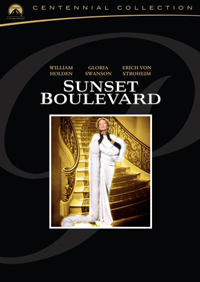 There has never been a screenplay quite like Charles Brackett and director Billy Wilder’s screenplay for their 1950 opus Sunset Blvd. It’s a macabre gothic noir comedy about the ghosts of Hollywood past. It’s one of those films, though a first-string classic, where the myths and back-stage stories are just as memorable as the film itself. For a legendary cynic like Wilder it was his ultimate drubbing of the hand that fed him. For star Gloria Swanson it was the ultimate film comeback (ten times more unlikely than, say, Travolta in Pulp Fiction). And for her co-star William Holden it began a decade of big performances in important films that cemented him as a major actor. In a time when the studios controlled their products as well as their own image with an iron fist, it’s shocking that Sunset Blvd. ever got made.
There has never been a screenplay quite like Charles Brackett and director Billy Wilder’s screenplay for their 1950 opus Sunset Blvd. It’s a macabre gothic noir comedy about the ghosts of Hollywood past. It’s one of those films, though a first-string classic, where the myths and back-stage stories are just as memorable as the film itself. For a legendary cynic like Wilder it was his ultimate drubbing of the hand that fed him. For star Gloria Swanson it was the ultimate film comeback (ten times more unlikely than, say, Travolta in Pulp Fiction). And for her co-star William Holden it began a decade of big performances in important films that cemented him as a major actor. In a time when the studios controlled their products as well as their own image with an iron fist, it’s shocking that Sunset Blvd. ever got made.
Narrating from a swimming pool of a rundown mansion, a floating corpse tells his story of how he ended up there. Down-and-out screenwriter Joe Gillis (Holden) can’t land a new assignment and is on the run from debt collectors. With a flat tire he hides his car in the garage of that rundown mansion. Invited in by the home’s butler, Max (Erich von Stroheim), to lend a hand for the funeral of a monkey Joe soon meets the mistress of the house, one-time silent film star, Norma Desmond (Swanson). She lives with only one foot in reality. Her decrepit house is filled with photos and mementos of her former self from her glory days 30 years earlier. Eventually she employs Joe to write her gaudy screenplay that she plans to use as a comeback vehicle. Joe also takes on the role of gigolo, becoming her lover as she keeps him dressed in tuxes and fancy gold watches.











